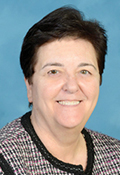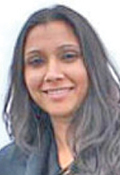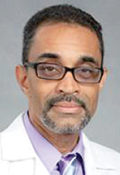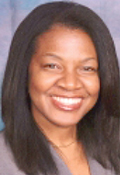By DALE SINGER
When victims of human trafficking seek help at Holy Cross Hospital in Fort Lauderdale, Fla., the staff wants to make sure patients don't feel abandoned and dismissed once their medical complaint is addressed.

Sr. Levasseur
To help meet that goal, the hospital is implementing STEP — the Sex Trafficking Exploitation Program. Sr. Rita Levasseur, RSM, the hospital's vice president of sponsorship and mission effectiveness, says the aim of the program is simple. "We want to help (trafficking victims) get their lives together," she says.
That means giving trafficking victims medical treatment using a trauma-informed care approach with the goal of building a lasting, trusting primary care relationship with people who too often can't be sure who has their best interests at heart. Beat down by physical or mental abuse, many trafficking victims find it difficult to trust others and open up to health care providers. Winning their confidence takes a sincere commitment over time.
"It's really about connecting with victims so they don't feel they don't have a place to go to talk and get help," says Regina Paulose, an international human rights attorney. Paulose helped organize the Holy Cross effort to advance the care of human trafficking victims in Broward County, Fla., in part by providing them a medical home. She said human trafficking victims and survivors will be connected with other resources as needed.

Paulose
The program started in early February, she said, and a growing number of providers have agreed to become involved in ongoing care to trafficking victims. Pediatricians are part of the STEP program, and other specialties including OB-GYN, oncology and cardiology are represented.
Patients will be identified through collaboration with several outside agencies, including the U.S. Immigration and Customs Enforcement; SunServe, an organization that provides services including mental health care to members of the lesbian, gay, bisexual and transgender communities; and the Nancy J. Cotterman Center, a rape crisis and child advocacy center that provides services in Broward County.
The STEP protocol is inspired by a primary care approach for trafficking victims started in 2016 by the University of Miami Miller School of Medicine in collaboration with Miami's Jackson Health System. The Miami program is called T.H.R.I.V.E., short for Trafficking Healthcare Resources and Intra-Disciplinary Victim Services and Education.
Prominence in Florida
Florida is one of the top three states for trafficking, along with California and Texas. Paulose said in the child sex tourism market in South Florida, some of the children are homeless when they are recruited, others come from stable homes and get lured into prostitution. "Some children are sold into slavery by their parents," says Paulose.

Symes
Dr. Stephen Symes of the University of Miami Health System says the South Florida area is a hot spot for human trafficking in part because of tourism and the kinds of low-paying, low-skilled jobs that industry offers. Individuals can feel trapped and at the mercy of people with power over them.
Undocumented immigrants are particularly susceptible to exploitation, and their circumstances can make them understandably wary of others. Plus, their interactions with the health care system may not always have had the best results, medically or in terms of trust-building encounters. For such patients, medical care typically has come through the emergency room, with no follow-up care.
"A lot of them have been through the health care system before and were treated poorly," Symes says. "No one would listen to their stories."
Therapeutic empathy
Listening and developing a sense of connection and empathy with their patients is the best way doctors can build the necessary relationship with victims of trafficking, experts say. One approach that helps lead doctors and others through the necessary steps is called SOAR to Health and Wellness Training. The SOAR acronym stands for Stop, Observe, Ask, Respond. It was developed by the U.S. Department of Health and Human Services.
Stop simply means doctors have to take the time out of their crowded schedule to listen to their patients' problems and give them the careful attention they need.
"The listening part is the hardest," Symes says. "The health care system is set up to act swiftly and act efficiently, to focus on a particular problem but not to step back and listen.
"If you run into someone who is suspicious and doesn't want to talk, you're going to write that person off as not communicative. You have five other patients waiting to come in. But it's really important to stop and listen and establish trust with the patient."
Observing the patients closely means getting them alone, away from the people who may have brought them in and could be the ones who lured them into trafficking in the first place. Signs to watch for might include branding, high anxiety, indications of torture or sexually transmitted disease.
Physicians have to ask the right questions about a patient's daily life and pay close attention to the nuanced clues in the encounters. Once they have evaluated what a patient needs, medical personnel have to respond with the appropriate resources. That final step can be difficult because of the variety of issues trafficking victims present.
The root cause of health issues may become clear only with sustained effort and concern, and solutions may fall outside of what is generally considered medical treatment. Symes recalls a patient who complained of a variety of health-related problems, but it took time for her to reveal her apartment was infested with cockroaches, he says.
"It was absolutely horrible, and this was traumatizing for the patient. Once we addressed that issue and got her a new apartment, a lot of those complaints disappeared."
Rescue fantasies
Symes recently conducted grand rounds at Holy Cross and found residents and physicians on staff who were eager to get involved but didn't know where to begin. He said treatment approaches like SOAR can help.
"To start from scratch is always harder than working with someone who has already done this and has a model that already exists," he says.
Hospitals should make sure that the doctors themselves aren't overwhelmed with the variety and severity of the special problems and situations these patients bring. Symes talks of doctors, nurses and patient navigators who have a "rescue fantasy." He said those practitioners in particular should take care the cases don't take a toll on them.
"Some of the stories they hear are really heartbreaking," he says, "so we have to make sure we have time to reflect and take care of our own psychological health and wellness so we can be effective providers of health care for our patients."

Aurelien
Authentic encounters
Dr. Patricia Aurelien, who will help guide the STEP program at Holy Cross, realizes that not every doctor on the staff will be suited to the work.
"There are some physicians who don't have the heart for this kind of thing," she says. "I think we just need to be educated on the signs, how to identify the patients who are involved in human trafficking, and how to be sensitive to their needs. It can be very, very sad."
It is also very necessary. Paulose says it's too early to judge the numbers of patients who will benefit from the STEP program, but she knows how success eventually will be measured.
"As long as the victims and survivors know that there are people here for them, that's one way," she says. "The other way is having doctors and community groups work together."
And Sr. Levasseur says serving trafficking victims furthers the Holy Cross mission. "This is who we are. That's why we're here, to help those who are in the greatest need.
"It's not what you do, it's who you are, and (patients) can sense that right away."
Copyright © 2018 by the Catholic Health Association
of the United States
For reprint permission, contact Betty Crosby or call (314) 253-3490.